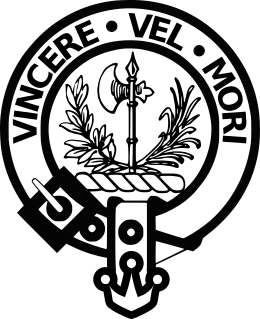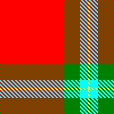Clan Maclaine of Lochbuie facts for kids
Quick facts for kids Clan Maclaine of Lochbuie |
|||
|---|---|---|---|
| MacGhille Eoin | |||
 |
|||
| Motto | Vincere vel mori (To conquer or die) | ||
| Profile | |||
| Region | Scottish Highlands | ||
| District | Lochbuie, Mull | ||
| Plant badge | Blackberry | ||
| Pipe music | Lament for MacLaine of Lochbuie | ||
| Chief | |||
| The Much Honoured Lorne Gillean Ian McLaine of Lochbuie, Baron of Moy | |||
| 26th Chief of Clan Maclaine of Lochbuie | |||
| Historic seat | Moy Castle | ||
|
|||
|
|||
The Clan Maclaine of Lochbuie is a Scottish clan. They lived in the Scottish Highlands. Their home was on the southern part of the Isle of Mull. This island is in the Inner Hebrides.
The name "Maclaine" is another way to spell "McLean." Clan Maclaine of Lochbuie and Clan Maclean of Duart are different clans. But they are like close family. They share a strong history. The current clan chief is Lorne Gillean Ian Maclaine of Lochbuie. He is the 26th chief. Both the Scottish Chiefs Council and the Lord Lyon recognize this clan.
Contents
Clan History: From Warriors to Chiefs
Who Started the Clan?
The Maclaines of Lochbuie have a long history. Their Gaelic name is Mac'ill-Eathain Locchabuide. They believe their family came from Maurice Fitzgerald. He was an Anglo-Norman knight. He moved to Ireland a long time ago.
Some of his family later moved to Scotland. This was in the 1200s. Two cousins from the Fitzgerald family are said to have started both Clan Maclean and Clan Mackenzie. A fierce warrior named Gillean-na-Taughe started the MacLean name. He was known as "Gillean of the Battle-Axe."
Gillean and his three sons fought Vikings. This was at the Battle of Largs in 1263. Later, Gillean signed an important document. It was called the Ragman Roll in 1296. He signed as "Gillean the Great, Son of Gillean."
Fighting for Scotland's Freedom
Gillean's grandson, Malcolm, led his clan in battle. This was during the Wars of Scottish Independence. They fought bravely at the Battle of Bannockburn. This battle helped Scotland become free.
The 14th and 15th Centuries: New Homes and Rivalries
Gillean's great-grandson was Iain Dubh, or Black John. He had two sons: Eachin Reaganach and Lachainn Lubanach. Eachin was known as "Hector the Stern." Lachainn was "Lachlan the Wily."
In the 1300s, Highlanders broke away from the Lowland kings. The MacLeans joined the Highlanders. They received land from John, Lord of the Isles. Lachlan married John's daughter. He and Hector moved to the Isle of Mull.
This is where the two main branches of the family began. These were the Maclaines of Lochbuie and the MacLeans of Duart. The Maclaines of Lochbuie used the "MacLean" spelling until the 1600s. Lachlan led the Duart branch. Hector led the Lochbuie branch.
Many clan members kept different spellings. These included Maclayne, McClain, and McLain. Other families joined the Maclaines. They were all accepted into the clan.
Around 1350, Hector received land on the Isle of Mull. This was from the Lord of the Isles. Hector also served on the Council of the Isles. Future chiefs of Lochbuie did too. This continued until 1493. Hector built Moy Castle in the 1300s. It is a classic Scottish tower house. It stands at Lochbuie, Mull. This land used to belong to the McFadzeans.
The MacLeans became powerful after joining the MacDonalds. They grew beyond Lochbuie. The Clan MacDonald was a very strong clan. They became jealous of the MacLeans' power. So, the MacLeans and Maclaines fought with the MacDonalds for many years.
Clan Lands and Famous Stories
Hector Maclaine received his lands around 1350. He chose to build his Moy Castle at the head of Lochbuie, Mull. Moy Castle was a beautiful Scottish tower house. It was the home of Maclaine chiefs until 1752. Then, Lochbuie House was built nearby.
Lochbuie House is a Georgian style house. It sits behind Moy Castle. It overlooks Lochbuie. Both Moy Castle and Lochbuie House still stand today. Lochbuie House is now owned by the Corbett family. Moy Castle is very old. You cannot go inside it. But it is a great example of old medieval buildings.
Over time, the Lochbuie branch owned lands in many places. These included Mull, Scarba, Jura, Morvern, Locheil, and Tiree. They were also given lands in Duror and Glencoe. But they never took them.
The Legend of Ewan the Headless
One famous legend is about the headless horseman. This story is linked to the Clan Maclaine of Lochbuie. Before 1538, Ewan lived on a cranog. This was an artificial island. It was in Loch Sghubhain, north of Lochbuie. Ewan was the son of Iain Og, the fifth chief.
Ewan's wife kept asking him for more land. This led to a big argument between Ewan and his father. A clan battle started. The two sides met at Glen Cannir. Iain Og was helped by the Clan Maclean of Duart.
During the fight, a claymore (a large sword) cut off Ewan's head. But his horse kept running. Ewan's headless body stayed in the stirrups. The horse was finally stopped. Ewan's body was buried on the island of Iona. You can still see his grave there.
The 17th Century and Civil War
John Mor was the seventh chief. He was known as an excellent swordsman. An Italian master-at-arms challenged Scottish nobles to a duel. John Mor accepted. He fought and killed the Italian. This happened in front of the king.
His son was Hector, the eighth chief. He started spelling the family name as Maclaine. This spelling was then used by all chiefs after him.
The Maclaines of Lochbuie were traditionally Roman Catholic. They were proud to have a Scottish king. So, they fought for the Royalists in the English Civil War. They fought against Oliver Cromwell and his Parliamentarians.
Murdoch Mor was the tenth chief. He fought for James Graham, 1st Marquis of Montrose in 1645. Because of this, he lost his lands. But they were given back to him in 1661.
Hector, the twelfth chief, won the first battle of the Jacobite campaign in 1689. He defeated five troops of horsemen. These troops were sent by Hugh Mackay's army. Hector also fought in the Battle of Killiecrankie. Mackay's forces were destroyed there in the same year.
The 18th Century and Jacobite Risings
In 1745, Bonnie Prince Charlie tried to take the throne. But Duncan Forbes, Lord Culloden convinced the Maclaines of Lochbuie not to join him. So, the Maclaines and MacLeans were safe. They did not suffer the consequences of Charles's defeat. This defeat happened at the Battle of Culloden. Later, the Maclaines became Presbyterian. This was because that religion became more popular.
During the American Revolution, many Highland regiments were formed. Almost all of them had a MacLean or a Maclaine. Many Maclaines and MacLeans moved to North Carolina before the Revolution. These settlers mostly supported the British during the war.
Clan Family Names (Septs)
Many Scottish people who moved away could not read or write. They also had strong accents. This made it hard to understand them. So, their names might have been changed or misspelled. This makes it tricky to find which clan your Scottish ancestors came from.
Here are some surnames linked to Clan MacLean. More specifically, they are linked to the Maclaines of Lochbuie. There are over 200 different ways to spell these names:
- McLean, Maclaine, McClain, McLain, MacLayne, MacLean, Lane, Laine, Lain, Layne, Lean
- McFadyen, McFadzean, McFayden, MacFadden, MacFadyen, McPhadon, McFadzean, McPhadzean, Fadden
- MacCormack, McCormick, Cormack, Cormick
- MacGillivray, MacIlvora
- MacBay, MacVay, MacAvoy, Avoy, MacEvoy, Evoy
- MacFetridge, Patton, Patten, Paton, Peden
- Douie, Huie, Beaton, Black, Clanachan, McSpadden
Clan Symbols and Recognition
Clan Crest
The clan crest shows a laurel branch and a cypress branch crossed. A battleaxe stands upright on top. The clan motto is "Vincere Vel Mori." This is Latin for "Conquer or Die."
Clan Plant
The clan's special plant is the Blaeberry, also called "bramble."
Clan Tartan
Clan Music (Pìobaireachd)
The clan's special pipe music is Cumha Mhic Ghilleathain. This means "Maclaine of Lochbuie's Lament."
You can find more information on the clan's official website: www.clanmaclaine.org.
Clan Chiefs: A List Through Time
The Clan Maclaine of Lochbuie has had many chiefs. Here are some of them:
| Chief Number | Name | Birth Year | Death Year |
|---|---|---|---|
| 1 | Hector Reaganach Maclean, 1st Laird of Lochbuie | 1330 | 1407 |
| 5 | John Og MacLean, 5th Laird of Lochbuie | 1470 | 1538 |
| 8 | Hector MacLean of Lochbuie, 8th Chief | 1555 | 1614 |
| 10 | Murdoch Mor MacLean of Lochbuie, 10th Chief | - | 1662 |
| 12 | Hector MacLean of Lochbuie, 12th Chief | 1697 | 1706 |
| 26 | Lorne Gillean Iain Maclaine | 1945 | - |
 | William L. Dawson |
 | W. E. B. Du Bois |
 | Harry Belafonte |



